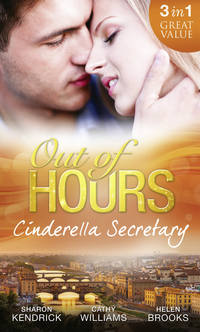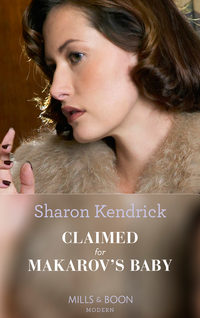
Which wouldn’t matter one iota, if Niko’s first impression of her was correct and she’d set her sights on a much more rewarding prize. What she earned in a year as a nurse wouldn’t amount to pocket change if she married his father.
Wondering if she had any idea how potentially damaging her revelation was, he said, “Then why take the risk?”
“Because your father was alone in a foreign country without friends or family to look after him when he was released.”
“He had a son. If you’d thought to contact me, I could have been there within twenty-four hours.”
“Maybe,” she said gently, “he didn’t want to bother you.”
“So he bothered a perfect stranger instead, even though doing so might end up costing her her job. Tell me, Emily, how do you propose to explain your absence from the hospital?”
“I won’t have to. I took a three-month leave of absence and scheduled it to coincide with his discharge.”
“A noble gesture on your part, giving up your holiday to look after my father.”
“Well, why not? I had nothing else planned.”
Except setting aside an hour a day to polish your halo! Struggling to hide his skepticism, Niko said, “All work and no play hardly seems fair. We’ll have to see what we can do to change that.”
A sudden gust of wind rattled the French doors, making her jump. “Just being here is change enough. If the weather ever clears up, I’m sure Pavlos won’t begrudge me the odd day off to see the sights.”
“Count on both,” he said, recognizing opportunity when it presented itself. “And on my making myself available to act as tour guide.”
“That’s nice of you, Niko.”
No, it’s not, he could have told her. Because whatever her motives, his were anything but pure. And because he’d meant it when he said he wasn’t a nice man.
They passed the remainder of the meal in idle conversation, interrupted only by intermittent bursts of rain at the windows, but before coffee was served, she’d run out of things to say and was wilting visibly. Even he, unscrupulous bastard though he undoubtedly was, felt sorry for her. The long transatlantic flight would have been tiring enough, without the added strain of looking after his father. So when she set aside her napkin and begged to be excused, he made no attempt to stop her, but left the table himself and walked her to the foot of the stairs.
“Good night,” she murmured.
“Kali nikhta,” he returned. “Sleep well.”
She was perhaps halfway to the upper landing when a brilliant flash of lightning arrowed through the night. Almost immediately, the electricity failed and plunged the house into darkness.
He heard her startled exclamation and the click of her high heel hitting the edge of the marble step as she stumbled to a halt. “Stay put,” he ordered, well aware how treacherous the staircase could be to the unwary. Once, when he was still a boy, a new housemaid had slipped and broken her arm—and that had been in broad daylight. But he’d grown up in the villa; could quite literally have found his way blindfolded anywhere within its walls, and was at Emily’s side before she, too, missed her footing.
Just as he reached her, a second bolt of lightning ripped through the night, bleaching her face of color, turning her hair to silver and her eyes into pools as huge and dark as those found in undersea caverns. “What happened?” she whispered, clutching the bannister with one hand as she teetered on the edge of the stair.
Instinctively he pulled her close with an arm around her shoulders. They felt slender, almost childlike to the touch, but the rest of her, pinned warm and sweet against him, was unmistakably all woman. “The lights went out,” he said, resorting to the absurdly obvious in an attempt to deflect her attention from the fact that his body had responded to hers with elemental, albeit untimely vigor.
She choked on a laugh. “I pretty much figured that out for myself.”
“I expect a power pole was struck.”
“Oh,” she said faintly, aware as she had to be of her effect on him. Blatant arousal was difficult to hide at such close quarters. “Does it happen often?”
Were they talking about the same thing, he wondered, as his mind fought a losing battle with his nether regions. “No, especially not at this time of year.”
“I ought to make sure your father’s all right.”
“No need,” he said, hearing footsteps and noticing the shadow of candle flames flickering over the walls at the rear of the downstairs hall. “Georgios is already on the job. But if it’ll ease your mind any, I’ll see you as far as your suite, then go check on him myself. Do you know which one you’re in?”
“Only that it’s blue and cream, with some gorgeous antique furniture, including a four-poster bed.”
He nodded, recognizing her description, and keeping one arm looped around her waist, steered her the rest of the way up the stairs, turned right along the landing and felt his way along the wall on his left until he made contact with her door. Pushing it wide, he directed her inside.
The logs in the fireplace had burned down, but enough of a glow remained to fill the room with dim orange light. Enough that when she looked at him, their gazes locked, held prisoner by the sexual awareness, which had simmered between them from the moment they’d first set eyes on each other.
He hadn’t meant to kiss her this early in the game, had planned a much more subtle attack, but when she turned within the circle of his arms and lifted her face to his, it was the most natural thing in the world for him to tighten his hold until she was once again pressed against him. The most natural thing in the world to bend his head and find her mouth with his.
CHAPTER THREE
EMILY had been kissed before, many times, but always with some part of her brain able to rate the experience objectively: too slobbery, too bland, too aggressive, too many teeth, too much heavy breathing, not enough tenderness. More often than not, kissing, she’d concluded, was a vastly overrated prelude to romance. Until Niko Leonidas came on the scene, that was, and felled her with a single blow.
Except “blow” was no more the right word to define his effect on her than “kiss” adequately described his action. What he did with his mouth transcended the ordinary and surpassed the divine. Cool and firm, it yet seared her with its heat. Though undemanding, it somehow stripped her of everything—her independence, her focus, her moral compass, even her sense of survival.
Apart from one rash, distinctly forgettable experience, she’d chosen to remain celibate because sex for its own sake held no appeal, and she’d never come close to being in love. But she’d have let him take her there on the floor, if only he’d asked. Would have let him hike up the skirt of her dress and touch her as no other man ever had. For as long as his kiss held her in its spell, she would have let him have his way with her however he wished.
Obviously he did not wish for a fraction of what she was willing to give. Because releasing her, he stepped back and said, rather hoarsely to be sure, “I’ll go look in on my father and see about getting some candles up here.”
Weak as water, she clutched the back of a nearby chair and nodded. She couldn’t have spoken if her life depended on it. Although he’d put a respectable distance between them, she remained trapped in his aura. Her body still hummed. Her breasts ached. Moisture, warm and heavy, seeped between her thighs.
When he turned away, she wanted to cry out that she didn’t need candles, she only needed him. But the words remained dammed in her throat and he was gone before she could free them. Dazed, she lowered herself to the chair and waited for him to return.
A brass carriage clock on the mantelpiece marked the passing minutes. Gradually its measured pace restored her racing pulse to near-normal and brought a sort of order to her scattered thoughts. What kind of madness had possessed her, that she’d been ready to give herself to someone she’d known less than a day? He spelled nothing but trouble.
I won’t let him in when he comes back, she resolved. I’m out of my league with such a man and don’t need the heartbreak an affair with him would bring.
But when a discreet tap at her door signaled his return, all logic fled. Heat shot through her, giving rise to a single exquisite throb of anticipation that electrified her. She couldn’t get to him fast enough.
Pulling open the door, she began, “I was beginning to think you’d abandoned—!” then lapsed into mortified silence at the sight of Georgios standing there, a lighted silver candelabra in one hand, and a battery operated lantern in the other.
“Niko asked me to bring these, thespinis,” he informed her politely, “and to tell you that Kirie Pavlos is sleeping soundly.”
Rallying her pride, she stood back to let him pass into the room, and mumbled, “Thank you.”
“Parakalo.” He placed the candelabra on the dresser and handed her the lantern. “I am also to tell you that he has been called away.”
“At this hour of the night?” She made no attempt to hide her disbelief.
He nodded. “Ne, thespinis. He received an urgent phone call and will most likely be gone for several days.”
Oh, the louse! The cowardly, unmitigated rat! Swallowing the anger and humiliation threatening to choke her, she said scathingly, “It must have been some emergency to drag him out in the middle of a storm like this.”
Georgios stopped on his way to the door and shrugged. “I cannot say. He did not explain the reasons.”
“Never mind. It’s not important.” He wasn’t important. She was there to look after the father, not chase after the son.
“Thank you for the candles and flashlight, Georgios. Good night.”
“Kalispera, thespinis. Sleep well.”
Surprisingly she did, and awoke the next day to clear skies and sunshine. Last night’s storm was as much a part of the past as last night’s kiss.
Pavlos was already up and dressed when she went downstairs. He sat on the veranda outside his sitting room, gazing out at the garden. A small empty coffee cup and a phone sat on a table at his side. A pair of binoculars rested on his lap.
Catching sight of her, he pressed a finger to his lips, and gestured for her to join him. “Look,” he whispered, pointing to a pair of fairly large birds. Pretty, with bluish-gray heads, pearly-pink breasts and brown wings mottled with black, they pecked at the ground some distance away. “Do you know what they are?”
“Pigeons?” she ventured.
He grunted disdainfully. “Turtle doves, girl! Timid and scarce, these days, but they come to my garden because they know they’re safe. And those over there at the feeder are golden orioles. Didn’t know I was a bird fancier, did you?”
“No,” she said, noting the spark in his dark eyes and his improved color. “But I do know you look much better this morning. You must have had a good night.”
“Nothing like being on his home turf to cure a man of whatever ails him. Not that that son of mine would agree. Where do you suppose he is, by the way? I thought he might at least stay over, my first night back.”
“No. He was called away on some sort of emergency.”
“Gone already, eh?” He squared his shoulders, and lifted his chin, a formidable old warrior not about to admit to weakness of any kind. “Off on another harebrained escapade, I suppose. Doesn’t surprise me. Never really expected he’d stick around. Ah well, good riddance, I say. You had breakfast yet, girl?”
“No,” she said, aching for him. He could protest all he liked, but she saw past his proud facade to the lonely parent underneath. “I wanted to see how you were doing, first.”
“I’m hungry. Now that you’re here, we’ll eat together.” He picked up the phone, pressed a button and spoke briefly with whoever answered. Shortly after, Georgios wheeled in a drop-leaf table set for breakfast for two, and equipped with everything required for what she soon realized was the almost sacred ritual of making coffee. It was prepared with great ceremony over an open flame, in a little copper pot called a briki, and immediately served in thick white demitasses with a glass of cold water on the side.
“No Greek worthy of the name would dream of starting the day without a flitzani of good kafes,” Pavlos declared.
Possibly not, and she had to admit the aroma was heavenly, but the strong beverage with its layer of foam and residue of grounds took some getting used to. She found the fruit and yogurt salad topped with almonds and drizzled with honey and a sprinkling of cinnamon much more enjoyable.
In the days that followed, she also found out that Pavlos had little faith in doctors, rated physiotherapists as next to useless and had no qualms about saying so to their faces. He could be fractious as a child when forced to suffer through the regimen of exercises prescribed to strengthen his hip, and sweet as peach pie if he thought Emily was working too hard.
While he napped in the afternoons, she swam in the pool, walked along the beach or explored the neighborhood, taking particular pleasure in the shops. In the evenings, she played gin rummy or poker with him, even though he cheated at both.
One morning, she was wheeling him along the terrace after his physiotherapy session when he asked, “Do you miss home?”
She looked out at the flowers in brilliant bloom, at the peacocks strutting across the lawns, the blue arc of the sky and the stunning turquoise sea. Soon the rainy season would come to Vancouver, its chilly southeasterly gales stripping the trees of leaves. People would be scurrying about under a forest of umbrellas where, just few weeks before, they’d been lying on the beaches taking in the last of summer’s sunshine. “No,” she said. “I’m happy to be here.”
“Good. Then you have no excuse for wanting to leave early.”
She thought not, either, until the beginning of her second week there, when Niko reappeared as suddenly as he’d left.
“So this is where you’re hiding,” he said, coming upon her as she sat reading in a wicker love seat on the patio—except they called it a veranda in Greece. “I’ve been looking everywhere for you.”
Though startled, she managed to hang on to her composure enough to meet his glance coolly and reply with commendable indifference, “Why? What do you want?”
Uninvited, he sat down beside her on the sun-warmed cushions. “To ask you to have dinner with me tonight.”
The nerve of him! “I don’t think so,” she said, projecting what she hoped was an air of cool amusement. “You’re likely to take off at the last minute and leave me to foot the bill.”
“The way I did the other night, you mean?” He grimaced. “Look, I’m sorry about that but—”
“Forget it, Niko. I have.”
“No, you haven’t. I haven’t, either, and nor do I want to. Spend the evening with me, and I’ll try to explain myself.”
“Whatever makes you think I’m interested in anything you have to say?”
“Because if you weren’t, you wouldn’t be so ticked off with me. Come on, Emily,” he wheedled, inching closer. “Be fair, and at least hear me out before you decide I’m not worth your time.”
“I usually play cards with Pavlos in the evening.”
“Then we’ll make it a late dinner. How is my father, by the way? I stopped by his suite before I came to find you, but he was sleeping.”
“He still tires easily, but he’s better since he started physiotherapy.”
“I’m glad he’s on the mend.” He glanced at her from beneath his outrageous lashes, stroked his finger down her arm and left a trail of shimmering sensation in its wake. “So what do you say, sweet thing? Do we have a date?”
Resisting him was like trying to trap mist between her hands. “If that’s what it takes for you to leave me to read in peace now, I suppose we do. But I won’t be free much before ten, after your father’s settled for the night.”
He edged closer still, a long, lean specimen of masculine grace, handsome as sin, dangerous as hell, and kissed her cheek. “I can wait that long,” he said, “but I’m not saying it will be easy.”
He took her to a restaurant on the water, about a fifteen-minute drive from the villa. She’d pinned up her hair in a sleek chignon, and wore a black dress she’d bought on sale in a boutique just a few days earlier, and high-heeled black sandals. Simple but beautifully cut, the dress had a narrow draped skirt, strapless bodice, and a shawl lushly embroidered with silver thread. Her only accessory was a pair of dangling vintage silver earrings studded with crystals.
All in all, a good choice, she decided, glancing at her surroundings. Unlike the bougainvillea-draped tavernas she’d seen in the neighborhood, with their paper tablecloths and simple, sometimes crudely constructed furniture, this place gave new meaning to the term stylish sophistication. Crisp linens, a single perfect gardenia at every place setting, deep, comfortable leather chairs, a small dance floor and soft music combined to create an ambience at once elegant and romantic.
They were shown to a window table overlooking a yacht basin. Tall masts rose black and slender against the night sky. Beyond the breakwater, moonlight carved an icy path across the sea to the horizon, but inside the room, candles cast a warm glow over the stark white walls.
Once they’d been served drinks and he’d chosen their meal—noting no prices were listed on the menu, she’d left him to decide what to order—Niko leaned back in his chair and remarked, “You look very lovely tonight, Emily. More like a fashion model than a nurse.”
“Thank you. You look rather nice yourself.”
Which had to be, she thought, mentally rolling her eyes, the understatement of the century. The superb fit of his charcoal-gray suit spoke of Italian tailoring at its best, and never mind the gorgeous body inside it.
He inclined his head and smiled. “I like your earrings.”
“They were my mother’s. She loved jewelry and pretty clothes.” She touched her fingertip to one crystal pendant, memories of her mother, all dressed up for an evening out, as clear in her mind as if they’d taken place just yesterday. “I still have all her things—her dinner gowns and shoes and beaded handbags.”
“Do you use them?”
“Not often. I don’t have occasion to.”
His gaze scoured her face, meandered down her throat to her shoulders, and it took all her self-control not to shrink into the concealing folds of her shawl. “What a waste,” he murmured. “A woman as beautiful as you should always wear beautiful things.”
“My mother was the beauty, not I.”
“You think?”
“I know,” she said, nodding thanks to the waiter as he presented a tray of appetizers. Mezedes, she’d learned, were as integral to the evening meal as the main course itself. “And my father was incredibly handsome. They made such a glamorous couple.”
“Tell me about them,” he said, resting his elbow on the arm of his chair, wineglass in hand. “What were they like—beyond their good looks, that is?”
“Crazy about one another. Happy.”
“Socialites?”
“I suppose they were,” she admitted, remembering the many times she’d watched, entranced, as her mother prepared for a gala evening on the town.
“What else?”
She stared out at the yachts rocking gently at their moorings. “They wrung every drop of enjoyment from life. They’d dance in the sitting room after dinner, go swimming at midnight in English Bay, dress up in fabulous costumes for Hallowe’en, decorate the biggest tree they could find at Christmas. They were on everyone’s guest list, and everyone wanted to be on theirs. And they died much too soon.”
Detecting the sadness infecting her memories, he framed his next question in quiet sympathy. “How did it happen?”
“They were on their way home from a party, driving along a road infamous for its hairpin bends. It was raining heavily, the visibility was poor. They were involved in a head-on collision and killed instantly.”
Again, his voice grazed her with compassion. “Ah, Emily, I’m sorry.”
Aware her emotions swam dangerously close to the surface, she gave herself a mental shake, sat a little straighter in her seat and firmly changed the subject. “Thank you, but it all happened a long time ago, and we’re here to talk about you, not me. So tell me, Niko, exactly what frightened you off after that impulsive kiss last week? And please don’t say you were too busy checking the main fuse box to find the cause of the power failure, because Georgios already told me you left after receiving a phone call. Had you forgotten you had a previous date, or was I so inept compared to the other women you know that you couldn’t wait to escape me?”
“Neither,” he said. “I had to go to work.”
“You work?”
“Well, yes, Emily,” he said, laughing. “Don’t most men my age?”
“Yes, but you don’t seem the corporate type.”
“I’m not.”
“And it was the middle of the night.”
“Right, again.”
“So?”
“So I had to prepare to leave Athens at first light, the next day.”
“To go where?”
“Overseas.”
“How tactfully vague. You’ll be telling me next you’re involved in smuggling.”
“Sometimes I am.”
It was neither the answer she was expecting nor one she wanted to hear. Tired of his stonewalling, she threw down her napkin, pushed back her chair and stood up. “If this is your idea of explaining yourself, I’ve had enough.”
“Okay,” he said, grabbing her hand before she could bolt, “I delivered some urgently needed supplies to a medical outpost in Africa.”
Abruptly she sat down again, her annoyance fading as the implication of his reply hit home. “Are you talking about Doctors Without Borders?”
“In this particular case, yes.”
Their waiter came back just then to whisk away the remains of the mezedes and deliver their main course. A dozen questions crowding her mind, she waited impatiently as he made a big production of serving grilled calamari and prawns on a bed of rice. “How did you get there?” she asked, when they were alone again.
“I flew,” Niko said.
“Well, I didn’t think you walked!”
His mouth twitched with amusement at her acerbic response. “I happen to own a small fleet of aircraft. It comes in handy on occasion.”
“Are you telling me you piloted your own plane?”
“In a word, yes.”
“Going into places like that can be dangerous, Niko.”
He shrugged. “Perhaps, but someone has to do it.”
She stared at him, her every preconceived notion of what he was all about undergoing a drastic change. “Where did you learn to fly?”
“After finishing my National Service, I spent five years as a Career Officer with the HAF—Hellenic Air Force. That’s when I first became involved in rescue missions. It irked my father no end, of course, that I chose the military over seconding myself to him and his empire.”
“Is that why you did it?”
“Not entirely. I loved the freedom of flying. And providing humanitarian aid wherever it’s needed struck me as a more worthwhile undertaking than amassing more wealth. How’s your calamari, Emily?”
“Delicious,” she said, though in truth she’d hardly tasted it. What she was learning about him was far more interesting. “You said a while ago that you own a fleet of aircraft, which I assume means you have more than one.”
“Ten in total, and a staff of fifteen. We’re a private outfit, on call twenty-four hours a day, seven days a week, and go wherever we’re needed, providing whatever kind of help is required. Last month, we joined forces with the Red Cross after an earthquake in northern Turkey left hundreds homeless. The month before, Oxfam International called on us.”
“Well, if you care so little for money, how are you able to afford all that? Does Pavlos support you?”
“You ought to know better than to ask such a question,” he scoffed. “Even if he’d offered, I’d have starved before I took a single euro from him. And for the record, I never said I didn’t care about money. It’s a very useful commodity. I just don’t care about his.”









